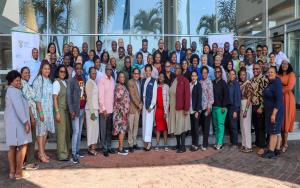South Africa launches national drive to eliminate schistosomiasis and intestinal worm infections in children
Durban—In a major milestone for child health, South Africa has launched a nationwide initiative to eliminate two of the country’s most neglected tropical diseases (NTDs) — schistosomiasis (also known as bilharzia) and soil-transmitted helminths (intestinal worms) — with the support of the World Health Organization (WHO) and other key partners. Schistosomiasis, like soil-transmitted helminthiasis, rabies snake bites and leprosy, make up the four NTDs that are endemic in South Africa and are of public health concerns.
The National Department of Health (NDoH), in collaboration with WHO, is rolling out a Mass Drug Administration (MDA) campaign targeting school-aged children (5–14 years) with annual praziquantel for schistosomiasis and albendazole for intestinal worms. This renewed drive aims to protect the health and future of millions of children in endemic areas.
“This initiative is a vital step towards sustainable progress in tackling NTDs in South Africa,” said Ms Tsakani Furumele, Programme Manager for Communicable Diseases at NDoH. “Having all provinces represented ensures we share essential updates and strengthen coordination for effective programme delivery.”
The announcement came during a five-day national technical training and planning workshop held in eThekwini, KwaZulu-Natal. The event brought together 86 multidisciplinary participants from all nine provinces. It was organized by the NDoH with technical and strategic support from WHO South Africa and the Expanded Special Project for Elimination of NTDs (ESPEN) under the WHO Regional Office for Africa. The workshop served as a launchpad for national rollout planning, including operational alignment, stakeholder coordination, and provincial microplanning.
In South Africa, an estimated 25 million people are at risk of schistosomiasis, with 7 million children considered the most vulnerable. Prevalence in some districts reaches as high as 60 percent. Schistosomiasis is primarily endemic in six provinces: KwaZulu-Natal, Limpopo, Mpumalanga, Gauteng, North West, and the Eastern Cape. Soil-transmitted helminths are co-endemic in all these provinces. While South Africa has conducted three rounds of large-scale school-based MDA for STH since 2016, a national-scale schistosomiasis MDA has not yet been implemented, aside from a pilot campaign in KwaZulu-Natal in 2024.
These infections contribute to anaemia, stunting, and cognitive delays. In the case of female genital schistosomiasis, there is an increased risk of infertility and HIV. Treating these diseases is not just a public health priority but a matter of dignity, equity, and future opportunity for millions of children.
WHO has played a key role in supporting South Africa’s renewed efforts. WHO South Africa and ESPEN provided technical assistance throughout the planning and training process. WHO also supported the validation of the draft National Operational Manual for MDA, which outlines implementation procedures, monitoring tools, and advocacy strategies aligned with global targets.
Dr Dhruv Pandey, WHO Multi-Country Technical Officer for Malaria and NTDs in Southern Africa, emphasized the urgency of the moment. “Schistosomiasis and STH control require sustained, multi-sectoral commitment. South Africa is one of only two countries globally yet to roll out full-scale MDA for schistosomiasis. Integrating MDA into existing health platforms is essential to reach vulnerable populations efficiently, in line with the WHO NTD Roadmap.”
The national strategy promotes integration with platforms such as school health services and routine immunization campaigns to improve coverage, efficiency, and sustainability. The effort is supported by strong interdepartmental coordination. The Department of Basic Education is facilitating school-based drug delivery. The Department of Water and Sanitation is improving water, sanitation and hygiene (WASH) infrastructure in endemic areas. The agriculture sector is helping to reduce transmission risks through a One Health approach.
In the coming months, focus will shift to provincial-level microplanning, implementation, and coverage monitoring, with progress reviews scheduled for early 2026. WHO and partners will continue to support capacity building, drug supply chain management, community mobilization, and impact evaluation. The eThekwini workshop marks a critical milestone in South Africa’s commitment to eliminating schistosomiasis and intestinal worm infections as public health problems. WHO remains a committed partner in supporting the country’s efforts to protect children’s health and build stronger, more equitable health systems for all.




